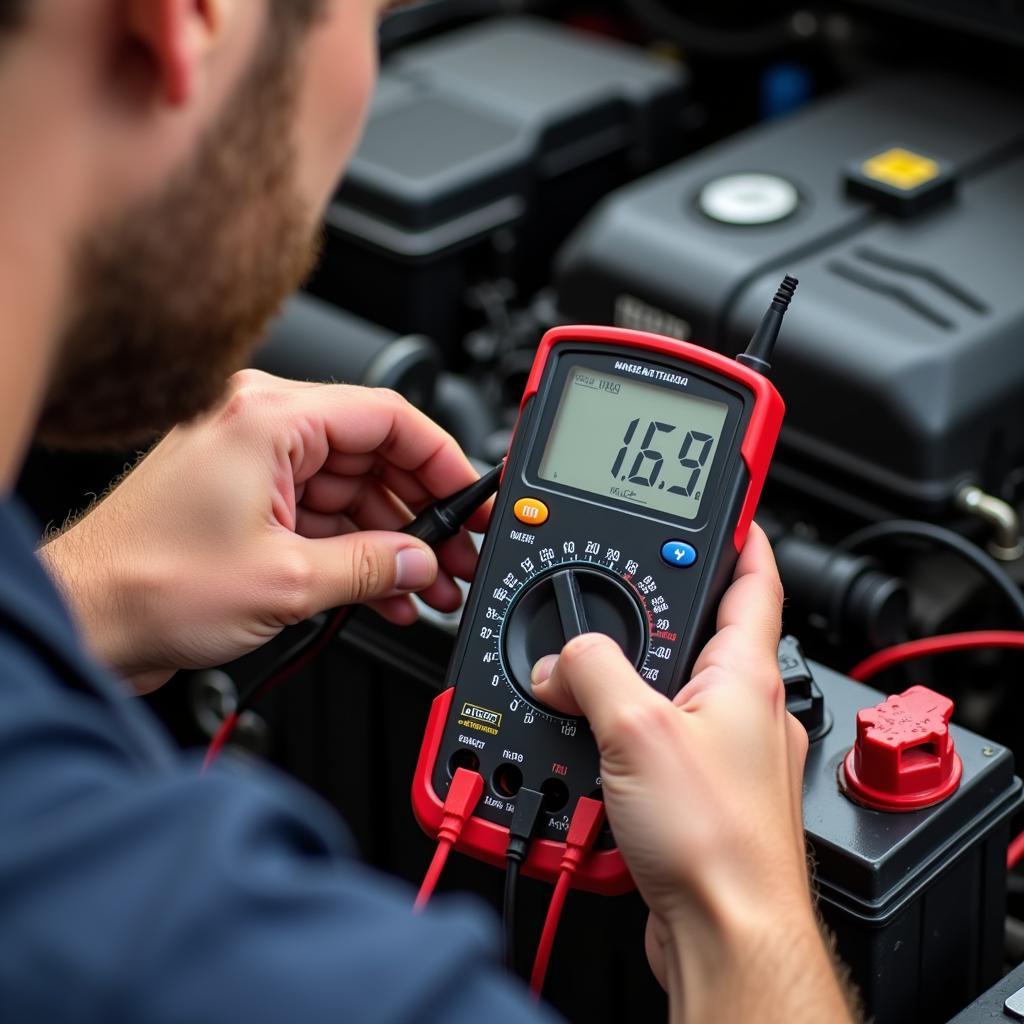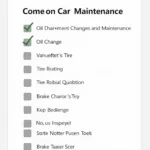You just got your car serviced, everything seems fine, and then boom – dead battery! It’s a frustrating situation many car owners face, leaving them stranded and confused. While regular car maintenance is crucial, a dead battery immediately afterward can be perplexing. Is it just a coincidence, or could the service be the culprit? Let’s dive in and find out why your car battery discharges after regular service and, more importantly, what you can do about it.
Common Causes of Car Battery Drain After Service
There are several reasons why your car battery might be acting up post-service. Here’s a look at some of the most frequent offenders:
1. Loose or Corroded Battery Connections
One of the most common culprits is a loose or corroded battery terminal. During service, your mechanic might have disconnected the battery, and if the terminals weren’t cleaned or properly reconnected, it can lead to a poor connection and battery drain.
2. Parasitic Draw
 Testing for Parasitic Draw with a Multimeter
Testing for Parasitic Draw with a Multimeter
Even when your car is off, certain components continue to draw a small amount of power, such as the clock, alarm system, and radio presets. This is called parasitic draw. However, a faulty component or an electrical issue can cause an excessive draw, draining your battery, especially if you don’t drive your car frequently.
3. Faulty Alternator
Your car’s alternator charges the battery while you drive. A failing alternator might not be immediately noticeable but could struggle to recharge the battery after a service, especially if the battery was disconnected or drained during the process.
4. Old Battery Reaching its End of Life
Sometimes, the timing is purely coincidental. A battery nearing the end of its lifespan might give way after a service, even if the service isn’t directly related to the battery.
Troubleshooting a Discharged Car Battery
Here are some steps you can take to identify and address the problem:
- Check the Battery Terminals: Inspect the battery terminals for any signs of corrosion (a white, powdery substance). If you find corrosion, clean the terminals with a baking soda and water solution. Ensure the terminals are tightly connected to the battery posts.
- Test the Battery: Use a multimeter to test your battery’s voltage. A fully charged battery should read around 12.6 volts. A significantly lower reading indicates a weak or discharged battery.
- Look for Signs of Parasitic Draw: If possible, use a multimeter to check for excessive parasitic draw. This involves disconnecting the negative battery cable and connecting the multimeter in series.
- Inspect the Alternator: With the engine running, check the battery voltage using a multimeter. A reading of around 14 volts suggests the alternator is charging correctly.
“If you are not comfortable working on your car’s electrical system, it’s best to consult a qualified mechanic to diagnose and fix the issue.” – John Smith, ASE Certified Master Technician
Preventing Future Battery Problems
Here are some tips to avoid finding yourself with a dead battery after your next service:
- Regular Battery Maintenance: Have your battery and charging system inspected regularly, especially as your battery ages.
- Limit Short Trips: Short trips don’t allow your alternator enough time to fully recharge the battery. If you mainly make short journeys, consider using a battery maintainer.
- Turn Off All Accessories Before Turning Off Your Car: This will minimize the drain on your battery when the engine isn’t running.
Conclusion
Experiencing car battery discharge after a regular service can be frustrating, but it’s usually a solvable problem. By understanding the common causes and following the troubleshooting tips above, you can often identify and resolve the issue. Remember, regular battery maintenance and prompt attention to any warning signs can go a long way in preventing future battery troubles. If you are unsure about any step of the process, don’t hesitate to consult a qualified mechanic for assistance.
Frequently Asked Questions
- How often should I replace my car battery? Most car batteries last between 3 to 5 years. However, factors like climate and driving habits can affect their lifespan.
- Can I jump-start my car if the battery is drained after service? Yes, you can jump-start your car. However, addressing the underlying cause of the drain is essential to prevent it from recurring.
- Is it normal for the battery light to come on briefly after a service? It can be normal for the battery light to flicker momentarily after a service, especially if the battery was disconnected. However, if the light stays on or comes on while driving, it indicates a problem with the charging system.
Need help with your car battery or any other car service needs? Contact our expert team via WhatsApp: +1(641)206-8880, or Email: [email protected]. We are available 24/7 to assist you.


